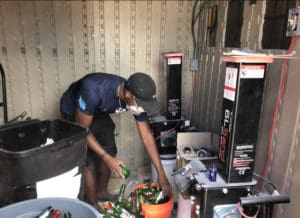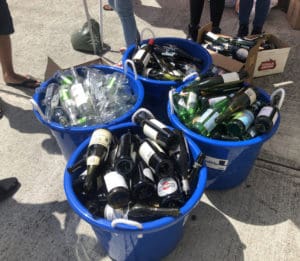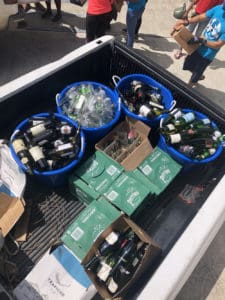
Howard Forbes Jr. came one step closer to his vision for glass recycling in the Virgin Islands on Saturday when dozens of St. Thomas residents showed up with their “greenies” and other beverage bottles at the WestBay parking lot on the Moravian Highway across from the airport.
It was the first time Forbes and his team of volunteers ventured beyond the University of the Virgin Islands, where he is the coordinator of the Virgin Islands Marine Advisory Service, to collect glass to feed the bottle crushers. Forbes – along with Jarvon Stout, community engagement specialist for VI EPSCoR, Forbes’ partner on the project – brought the glass crushing equipment to the territory in December.
While he viewed Saturday’s event as a success, he said there remains work to be done.
“We weren’t able to crush all of the glass we received on Saturday’s collection, and that was from about 50 persons who dropped off their glass,” he said.
But 511 bottles that yielded about 355 pounds of usable byproduct were all the team was able to crush on Saturday due to “time constraints,” though “we received several hundred more bottles.”
“We made an additional nine sandbags with what we were able to crush,” Forbes said.

Sandbags are one of the 20 uses for crushed glass and are in high demand in the USVI, especially during hurricane season. Prior to the 2020 season, government agencies were scrambling to find enough of them to pass along to residents to protect their homes from flooding in the event of storms.
See ‘VITEMA to Distribute Sandbags and Sand Territorywide, Aug. 13 and 18’
It is hard to get a firm number on the dollar cost of filled sandbags, but the cost to the environment seems obvious. With few exceptions, it is against the law in the Virgin Islands to take sand from beaches.
The material that comes from the crushed bottles is free – and saves money and keeps them out of the landfill. The labor and transportation, while being provided on Saturday at no cost, is not free in the long run, and expecting volunteers to give up their time to do it is not sustainable.
“I have already done most of the work getting the equipment here and developing a system, but I am going to need additional support to really expand this effort territorywide,” Forbes said.
He is working on a plan, which could include local businesses willing to be responsible for collection and crushing.

“I am not opposed to giving machines to folks, but they need to demonstrate that they have the capacity to run and maintain the operation and produce sandbags,” he said, adding, “These are $5,000 pieces of equipment that belong to UVI, and I need to make sure that the people who receive a machine can get the work done.”
A few enterprises are slated to receive or have already received the machines. These organizations have demonstrated their willingness to be responsible, including Damian MacLeavy (Love Your Bath and Kitchen) on St. Thomas, who plans to use the crushed glass to build countertops, Clean Sweep Frederiksted, a nonprofit on St. Croix, and the Department of Planning and Natural Resources’ Division of Fish and Wildlife in Red Hook, St. Thomas.
Beyond that, Forbes said, “Once we’ve developed a model for collection and transportation, then we can do much of the expanding that I am aiming to get done.”
Meanwhile, coordinating the effort to date has given him a new perspective.
“I see so many of these bottles littered on our roadsides and instead of seeing trash, I see money – actual money that people are throwing away.”
One of the surprising things Forbes has found on the road to glass crushing is that beverage bottles are among the top 10 items found discarded on roads and beaches. They are also found strewn about in the mangroves while attempting to make their way downhill to the sea.
“With the glass crusher, we now have the means to recycle glass beverage bottles,” Forbes said.
With all the challenges in changing the way the community sees litter, landfills and recycling, Forbes remains hopeful.
“I think once we can show people the value in some waste products that can be recycled into products that benefit us directly, we can get more buy-in.”


